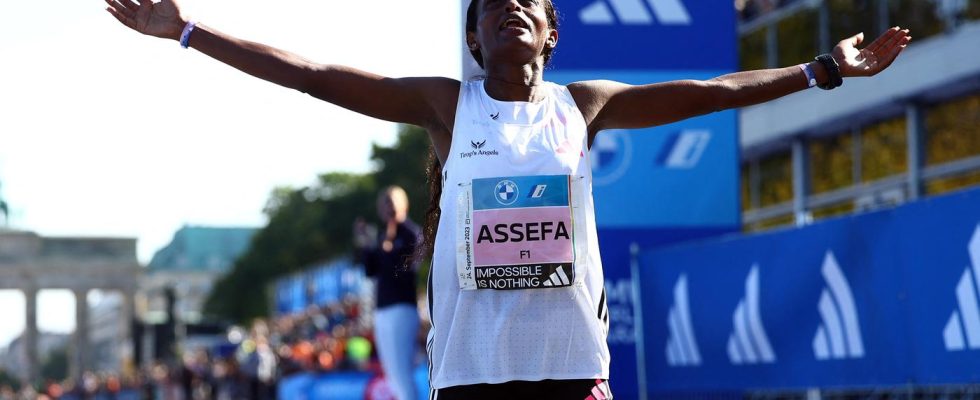Tigist Assefa crossed the finish line near the greasy Brandenburg Gate with a nonchalance, as if she had just taken a little morning lap through Berlin. In fact, she ran 42.195 kilometers in 2:11:53 hours. And remained more than two minutes below Brigid Kosgei’s previous world record (2:14:04 hours). This time, the lightness, it was almost a disturbing performance by the 29-year-old woman. In the final kilometers of the Berlin Marathon, Assefa was almost as fast as the men’s winner, Eliud Kipchoge. The Kenyan crossed the finish line in a time of 2:02:42 hours, exceeding his world record from last year in Berlin when he clocked in 2:01:09 hours.
It was a big day for German athletics. Amanal Petros set a new German record in 2:04:58 hours. Petros had announced great deeds. “I definitely want to run the best time,” he said two days before the race. He trained in Kenya for longer than ever before, four months. At an altitude of 2400 meters he lived in a training group with 35 athletes. “I gave up so many things, I’m glad I made it to the training camp,” he said.
He then advertised. He showed off his running shoes and claimed that they were the fastest shoes in the world. The sponsor will be happy. The only question seemed to be how many minutes he would improve the German record, which he himself held with a time of 2:06:27 hours.
Especially since race director Mark Milde also spoke of almost perfect conditions. A German record would still be missing from the Berlin Marathon, he noted. “But I don’t want to put pressure on now.” He didn’t need that because Petros had already done that on his own. The expectations were high.
As far as the conditions were concerned, Milde was right. It started at 16 degrees, 66 percent humidity and a very light westerly wind. However, a little different than last year. In 2022, the then Governing Mayor Franziska Giffey fired the starting shot from a pistol with an iron expression on her face, this year her successor Kai Wegner pressed a red buzzer with a smile.
Perfect conditions at the Berlin Marathon
And Eliud Kipchoge? He recently had to accept a disappointing result at the Boston Marathon. This year it was not certain what ambition he had when he came to Berlin this year. At least from the very slow best times of his pacemakers it was clear that he wasn’t necessarily planning on setting a new world record. The 38-year-old may have used the Berlin Marathon as a slow way to build up his form towards the Olympic Games in Paris next year.
His closest competitor Amos Kipruto from Kenya, winner of the London Marathon last year, started the race just a minute slower than Kipchoge. In the first few kilometers, the 31-year-old and his pacemakers were only a few meters behind the world record holder’s group.
The big topic before the race was possible actions by the “Last Generation”. Many police officers were on the side of the track and were supposed to prevent this. And shortly before the start they were challenged. Several people tried to sit on June 17th Street, but were pulled away by police and security forces. A video showed the activists throwing up buckets of orange paint, the paint spreading on the asphalt.
The top runners either didn’t notice this or weren’t deterred by it. The split times were already enormous: Kipchoge was on course for a world record after ten kilometers with 28:27 minutes, as was last year’s winner Tigist Assefa from Ethiopia (31:45 minutes at 10 kilometers). Amanal Petros was on course for a national record.
Assefa in particular amazed observers. The 29-year-old set extremely fast times per kilometer, sometimes running under three minutes per kilometer, and after 17 kilometers she was on a course of 2:12.47 hours, well below the world record time of 2:14.04. The group around Kipchoge, on the other hand, gradually became a little slower in their kilometer times from kilometer 15 onwards. Shortly after the kilometer, Kipchoge was no longer on the world record time.
The picture was completely different for women. After 25 kilometers it already seemed clear that Tigist Assefa would set a new world record. And if something came up, there were several other women who were close to setting a new record.
Assefa has had an unusual sporting career for a long-distance runner. She started over the middle distance, for example winning the 800 meters at the Istaf athletics meeting in Berlin in 2014. From 2016 to 2018, nothing was heard from the talented runner before she switched from the track to the road and increased her times enormously over long distances. Which also raised a lot of critical questions that shouldn’t diminish after Sunday’s performance.
Assefa had a big advantage compared to Kipchoge: While the exceptional runner was alone after 31 kilometers, the Ethiopian was able to orientate herself on the men running in front of her. Kipchoge became slower and slower, so that he almost had to let the group around Kipruto pass him. But he was the first to reach the finish line. Assefa, on the other hand, was running in spheres that had never been seen before in the women’s marathon until the end.

